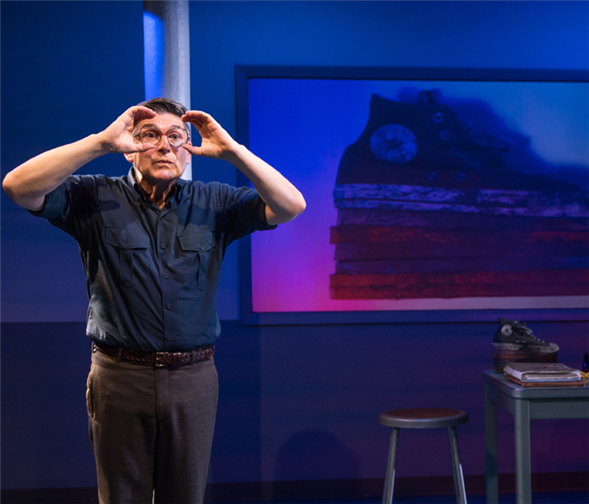Translate Page

James Lecesne brings his novel about a missing teen to the stage
---
When James Lecesne published his young adult novel Absolute Brightness in 2008, the world was a very different place. The story of a missing gay teenager, the book was almost eerily prescient in its depiction of teen bullying and the many forms it can take. And with bullying-related suicides seemingly always on the rise, our national conversation about harassment has become much more urgent in the last seven years. That's why Lecesne is bringing back his characters.
This time, however, he's adapted their story into a solo theatre piece. Currently playing at the Westside Theatre, The Absolute Brightness of Leonard Pelkey finds Lecesne himself playing the inhabitants of a small New Jersey town, all of whom are doing what they can to assist—or frustrate—Detective Chuck Desantis in his search for Leonard's whereabouts.
While Leonard's 16-year-old cousin Phoebe was the book's narrator, it's Chuck who guides the audience through the show.
{Image1}
"Phoebe's grasp on life is a little bit different," Lecesne says of his decision to refocus the material. "And the audience is different. Speaking to an adult audience, I wanted to make it a bit more complex, and I wanted to talk about some of the issues that had arisen since the book came out. Bullying became a much more prevalent issue, and sometimes the media has a tendency to simplify issues. I just wanted to get in a room full of adults and think about this issue." (A similar spirit animates The Trevor Project, an organization he co-founded in 1998 for LGBT teens in crisis. It's named after Trevor, the Academy Award-winning short film he wrote in the early 90s.)
In his play, Lecesne stokes conversation by letting us hear from a slew of men and women who were touched or appalled by Leonard's outsized personality for various reasons. The only person who doesn't make an appearance is Leonard himself.
"When I set out to write this, I knew he would not be in the show," Lecesne says. "One of the great things [is that] so much of the show happens in the imagination of the audience. You don’t have to do anything, really, except give them the props, and they go to work with their imagination. And what’s so amazing is that people have such a clear idea of who Leonard is."
For the men and women who do appear on stage, Lecesne uses different physical gestures and centers of gravity as "scaffolding," building up the characters from that structure. For Leonard's Aunt Ellen, a beauty parlor owner, Lecesne throws himself onto his toes as if he's tottering in heels. And the older, chainsmoking Marion's rasp immediately identifies her both as a character and as an individual.
Even having lived with some of these people for almost a decade, Lecesne says he was still surprised by what they had to say when he wrote this latest version of their lives. "Like Marion," he says by way of example. "I was surprised by how deep she was willing to go because she didn’t strike me as a particularly deep person. And the depth of her feelings was a particular surprise for me. And Phoebe surprised me in her courage to actually stand up and speak out despite her killing shyness."
All the characters had more to say in early drafts, and Lecesne credits director Tony Speciale with knowing what to cut without losing the show's heart. "I tend to overwrite and they tend to overshare, so I have to rein them in to tell the story," Lecesne says. "I get into the character, and I forget that they’re there to tell a story. So Gloria, the mob wife, she had a lot to say. She’s lonely. Nobody’s coming to visit her anymore. So it was twice as long and then it was like, 'Well, hello, we have a story to tell!'"
And just as much as in its first incarnation, that story still speaks directly to what young people encounter in the world.
---
Mark Peikert is the editor-in-chief of Backstage Magazine
Photos by Matthew Murphy. Top photo: James Lecesne as Gloria